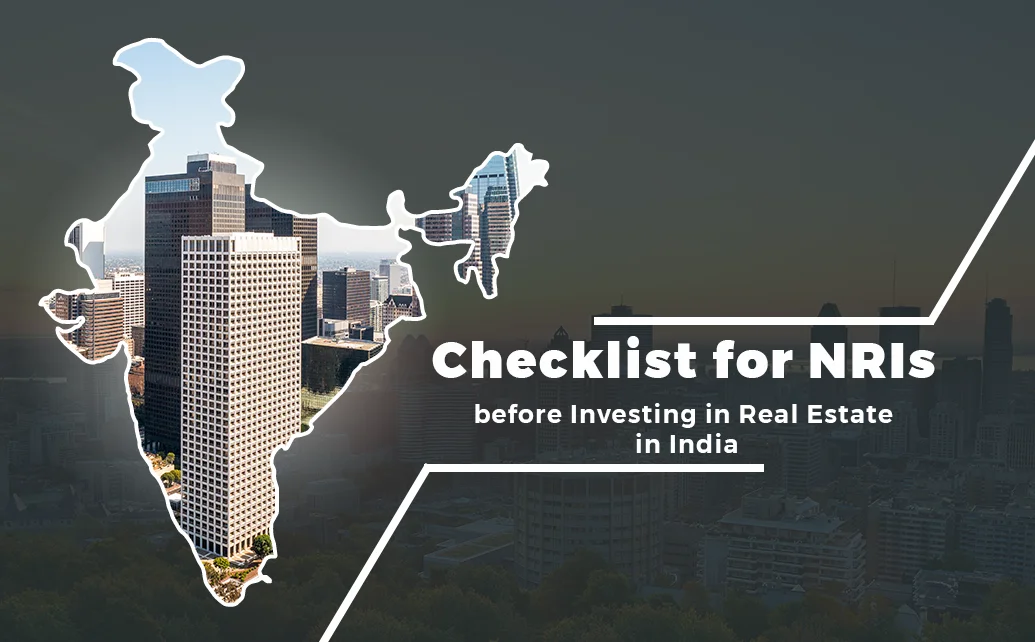A Comprehensive Checklist for NRIs Before Investing in Real Estate in India

Investing in real estate in India can be a lucrative opportunity for Non-Resident Indians (NRIs), given the country’s robust economic growth and expanding real estate market. However, the process can be complex and requires careful planning and due diligence. This blog provides a detailed checklist for NRIs to ensure a smooth and successful real estate investment in India.
Understanding the Indian Real Estate Market
Before diving into the specifics, it’s essential to understand the Indian real estate market. The sector has seen substantial growth in recent years, driven by urbanization, infrastructure development, and favorable government policies. However, it also comes with challenges such as regulatory changes, varying regional market conditions, and legal complexities.
The Checklist for NRIs Investing in Real Estate in India
1. Define Investment Goals
Objective: Clarify why you want to invest in Indian real estate.
- Capital Appreciation: Investing in areas with high growth potential.
- Rental Income: Choosing properties in high-demand rental markets.
- Holiday Home: Buying a property for personal use during visits.
- Future Residency: Planning for a retirement or return to India.
2. Understand Legal Framework and Regulations
RERA: Familiarize yourself with the Real Estate (Regulation and Development) Act, 2016, which aims to protect buyers and promote transparency.
- FEMA Regulations: NRIs must comply with the Foreign Exchange Management Act (FEMA), which governs property transactions for NRIs.
- Title and Ownership: Verify clear title and ownership of the property to avoid legal disputes.
3. Choose the Right Location
Research: Conduct thorough research on potential locations considering:
- Economic Growth: Cities with strong economic prospects like Bangalore, Hyderabad, Pune, and Chennai.
- Infrastructure Development: Areas with upcoming infrastructure projects such as metro lines, highways, and airports.
- Social Amenities: Proximity to schools, hospitals, shopping centers, and entertainment hubs.
4. Budget and Financing
Budgeting: Determine a clear budget including:
- Property Cost: Base price of the property.
- Additional Costs: Stamp duty, registration fees, maintenance charges, property tax, etc.
- Currency Exchange Rates: Keep an eye on currency fluctuations which can impact the overall cost.
Financing Options:
- Home Loans: Many Indian banks offer home loans to NRIs. Ensure you understand the interest rates, tenure, and eligibility criteria.
- Self-Funding: Using personal savings or other resources.

5. Legal and Documentation Process
Hire a Legal Expert: Engage a lawyer specialized in real estate to:
- Verify Property Documents: Title deed, encumbrance certificate, sale agreement, etc.
- Draft Agreements: Ensure all terms and conditions are legally sound.
- Due Diligence: Conduct a thorough check for any legal disputes or encumbrances.
Important Documents:
- Passport and Visa: Valid identification.
- PAN Card: Required for property transactions in India.
- Proof of Address: Both in the current country of residence and in India.
- NRI Account: An NRO/NRE account for financial transactions.
6. Builder Reputation and Project Approval
Research the Builder:
- Track Record: Look at past projects and their delivery timelines.
- Reviews and Ratings: Check online reviews and ratings from previous buyers.
- Financial Stability: Ensure the builder has a stable financial background.
Project Approval:
- Approvals and Licenses: Ensure the project has all necessary approvals from local authorities.
- RERA Registration: Verify if the project is registered under RERA.
7. Tax Implications
Understanding Taxation:
- Income Tax: Rental income from property in India is taxable.
- Property Tax: Payable annually to the local municipal body.
- Capital Gains Tax: Applicable on the sale of property. Long-term capital gains (property held for more than 2 years) attract lower tax rates compared to short-term gains.
DTAA Benefits: India has Double Taxation Avoidance Agreements (DTAA) with several countries. Understand how to avail these benefits to avoid paying tax in both countries.
8. Rental Management
Rental Potential: Assess the rental market in the chosen location.
- Rental Yields: Compare the rental income potential against the investment.
- Tenant Management: Consider hiring a property management service to handle tenant issues, rent collection, and maintenance.
9. Remittance and Repatriation
Remittance Rules: Ensure compliance with FEMA guidelines for remittance of rental income and sale proceeds.
- NRO/NRE Accounts: Use these accounts for easy remittance and repatriation of funds.
10. Monitor and Maintain the Property
Regular Visits: Plan periodic visits to check the condition of the property.
- Maintenance: Engage local property management services for regular upkeep and maintenance.
- Insurance: Insure the property against natural calamities and other risks.
Investing in real estate in India as an NRI can be a rewarding venture if approached with careful planning and due diligence. By following this comprehensive checklist, you can navigate the complexities of the Indian real estate market, ensure compliance with legal regulations, and make informed decisions that align with your investment goals. The Indian real estate market holds immense potential, and with the right strategy, NRIs can capitalize on this opportunity for substantial returns and long-term benefits.
